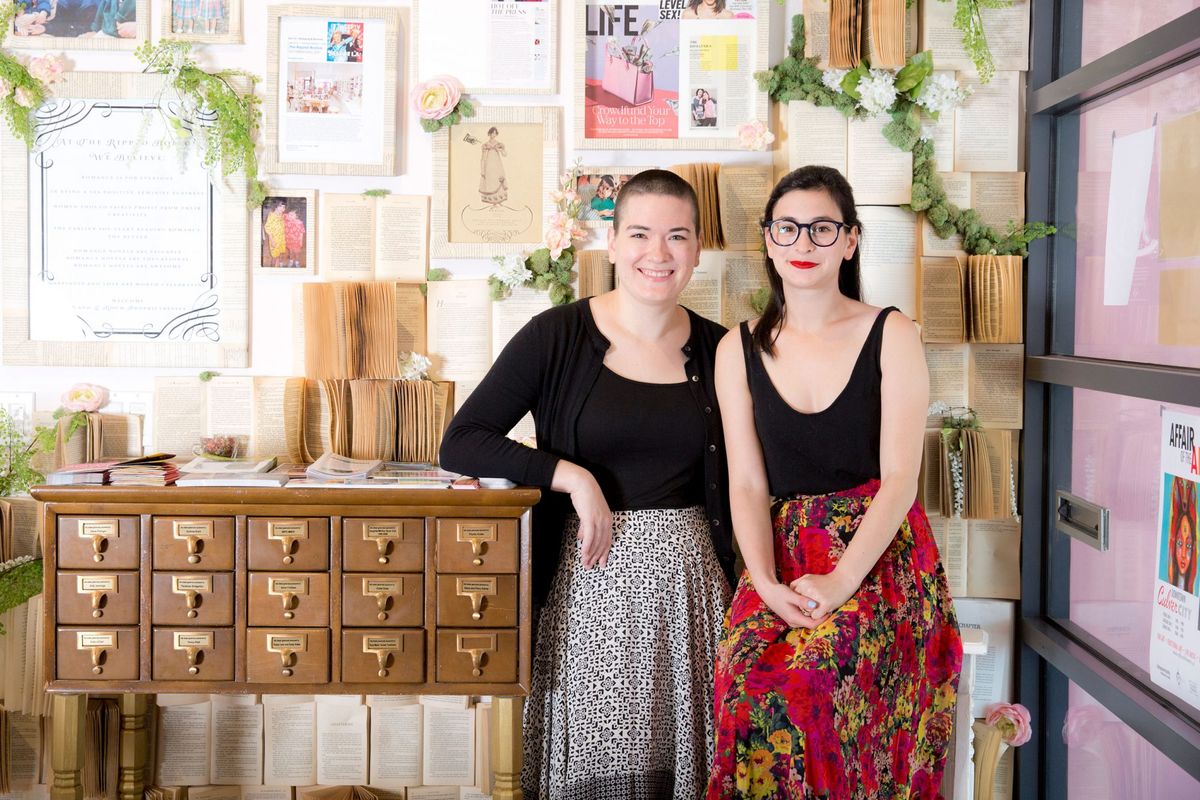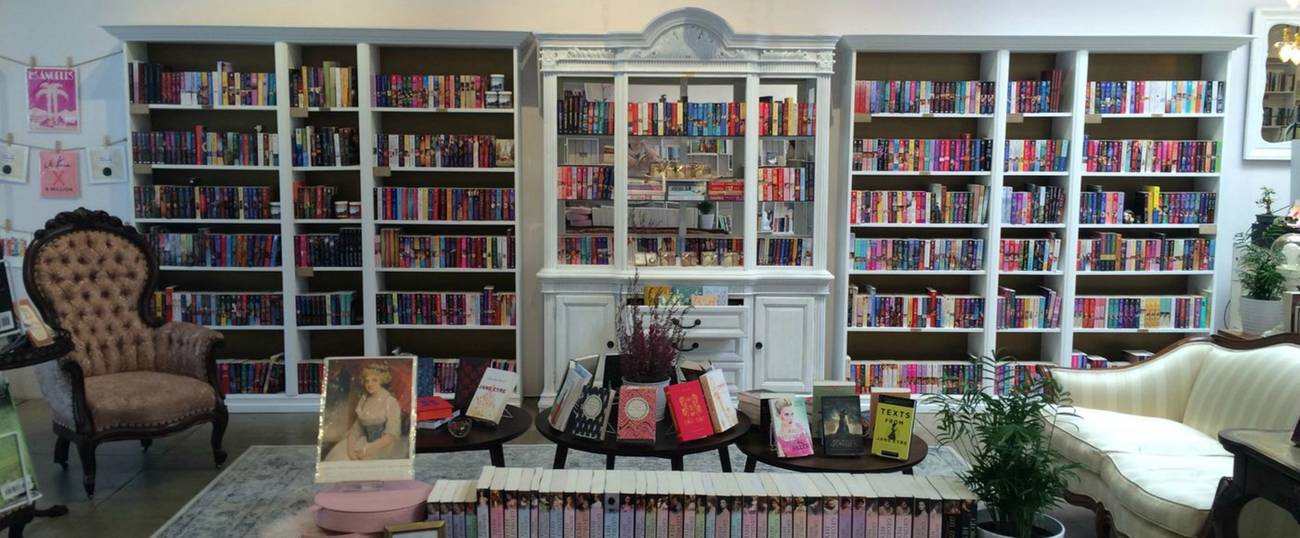The Ripped Bodice is breaking barriers in the romance genre

A few minutes every morning is all you need.
Stay up to date on the world's Headlines and Human Stories. It's fun, it's factual, it's fluff-free.
The Ripped Bodice, co-owned by sisters Leah and Bea Koch, is the only exclusively romance bookstore on the West Coast. Residing in Culver City, Los Angeles’ epicenter of movie history, a pink brick-and-mortar independent bookstore flags down bibliophiles with its name hanging on a book-shaped sign. The Ripped Bodice opened its doors to readers of romance fiction in 2016.
Along with their impressive selection of books, they also display myriad gift items meant to promote independent, women-owned businesses. Much of the interior invokes a Jane Austen aesthetic, with open paperbacks lining the walls and dangling from the ceiling. Ostentatious armchairs framed by warm wood sit empty unless occupied by guest speakers, and a fainting couch pays homage to Victorian femininity.
Where it all began
The Koch sisters grew up in Chicago, Illinois and developed a taste for romance novels at a young age. Bea graduated from Yale University and New York University, where she channeled her love of romance into her graduate thesis (later inspiring the name of her bookstore), “Mending the Ripped Bodice.” She recently released her first book, “Mad & Bad: Real Heroines of the Regency,” which examines lesser known historical figures of a highly romanticized time period.
Leah attended the University of Southern California and graduated with honors and a degree in visual and performing arts. While Bea prefers historical romance, Leah loves contemporary romances featuring lesbians.
Upon founding The Ripped Bodice, the Koch sisters began to engage in projects that are still ongoing, including a report of racial diversity in the romance genre and a subscription box for loyal customers. From paranormal and historical fiction to erotica and children’s literature, The Ripped Bodice carries stories for every reader to cross its threshold.
The diversity of subgenres within romance speaks to its widespread popularity. After all, don’t we all crave connection?
“I think that it appeals to us for the reason it appeals to so many people, which is that it’s centered on human relationships and inner lives in a way that other genres aren’t,” muses co-owner Leah Koch. “The guaranteed happy ending means that you have much room to explore what happens on the way to that. I find that really comforting in times of stress, like perhaps a pandemic.”
Reinventing the romance genre
So why is there so much stigma surrounding romance? “You don’t have to look very hard to encounter an extremely misogynistic attitude toward a genre primarily dominated by women and marketed toward women,” says Koch matter-of-factly.
Gatekeeping within the publishing world extends beyond patriarchy to include racism, sexism and ableism. Narratives following heterosexual white characters abound in traditional publishing, while stories by and featuring queer BIPOC people are sparse. Marginalized writers began to seek alternative methods of sharing their work, including self publication.

“The LGBTQ section of the bookstore is obviously very important to me, and I think that we really focus on making it visible and accessible,” says Koch. “We try to be cognizant of the fact that people who might want to shop in that area of the store might not be comfortable asking where it is, which is why it’s the first thing you see when you walk in. It’s really about seeking out as many titles as we can find.
“Independent bookstores have a lot of varying policies, but a lot of them do not carry very many – if any – self-published books. I think that self-published books have a much worse reputation in other genres. It was really embraced 15 to 20 years ago by people who had been kept out of traditional publishing like queer people and Black and Indigenous individuals.
“It’s not enough to carry books that major publishers are putting out that have queer romances because there’s like five a year. It would be a very tiny section. So we really like to explore smaller presses and self-published books, which is often where a lot of the most interesting work happens.”
Upon observing the representation gap within romance, Bea and Leah sought to contribute something to the conversation. They created a report called The State of Racial Diversity in Romance Publishing, which tracks publications by BIPOC authors in the traditional romance genre. The study includes institutions, imprints and small presses like Simon and Schuster, Avon Romance and Crimson Romance.
“The fight and the conversation had been going on for so long and authors of color had been telling everyone that this is a problem, and still in 2016,” says Koch. “Publishers were saying it’s not as big a problem as you’re saying it is, and also we’re working on it. No one really had any proof that they were lying. There was nothing to do except take their word for it.
“When we became part of the industry in a professional capacity, we were searching for something we could contribute to the conversation that didn’t already exist. The advocacy was already being done. There was no need for our voices to add to that.
“Other people were already saying, ‘yes, this is a problem.’ It was more about how we could help strengthen their argument. We felt like what might help is more hard numbers and proof.”
With reports published each year from 2016 to 2020, the numbers unveil disheartening statistics. For every 100 books published in 2016, only 7.8 were written by BIPOC authors. The number dropped to 6.2 in 2017, rose to 7.7 in 2018, 8.3 in 2019 and 12 in 2020. The most recent report notes that if they excluded Kensington (44.8% of published books by BIPOC authors) from the statistics, the number would have remained 8.3 like the previous year.
After the 2020 Black Lives Matter protests spurred by police brutality, specifically the murder of George Floyd, many companies and institutions have doubled their diversity and inclusion efforts. Will 2021’s romance report reflect America’s confrontation of racism? Or has the publishing industry and its output remained almost exclusively white?
“You’re on a continued quest to see yourself in a romance novel,” says Koch on why representation within books matters. “When you see yourself represented in a romance novel, it’s almost like the author is saying to you, ‘you are worthy of love.’”
Support The Ripped Bodice by ordering books online, signing up for the subscription box, becoming a patron or visiting in person.
Is your business doing something cool that you want to show off? Get in touch at hello@themilsource.com




Comments ()